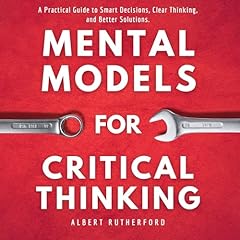
The Great Mental Models, Volume 2
Physics, Chemistry, and Biology
No se pudo agregar al carrito
Solo puedes tener X títulos en el carrito para realizar el pago.
Add to Cart failed.
Por favor prueba de nuevo más tarde
Error al Agregar a Lista de Deseos.
Por favor prueba de nuevo más tarde
Error al eliminar de la lista de deseos.
Por favor prueba de nuevo más tarde
Error al añadir a tu biblioteca
Por favor intenta de nuevo
Error al seguir el podcast
Intenta nuevamente
Error al dejar de seguir el podcast
Intenta nuevamente
Prueba gratis de 30 días de Audible Standard
Selecciona 1 audiolibro al mes de nuestra colección completa de más de 1 millón de títulos.
Es tuyo mientras seas miembro.
Obtén acceso ilimitado a los podcasts con mayor demanda.
Plan Standard se renueva automáticamente por $8.99 al mes después de 30 días. Cancela en cualquier momento.
Compra ahora por $18.00
-
Narrado por:
-
Grover Gardner
The second book in the timeless Great Mental Models series.
Time and time again, great thinkers such as Charlie Munger and Warren Buffett have credited their success to mental models–representations of how something works that can scale onto other fields.
Mastering a small number of mental models enables you to rapidly grasp new information, identify patterns others miss, and avoid the common mistakes that hold people back.
Volume 2 of The Great Mental Models series provides a collection of over twenty important concepts from physics, chemistry, and biology in a clear and accessible style. Not only will you better understand the hidden forces that influence the world around you, you’ll also learn how those forces can work to your advantage.
Some of the mental models covered in this book include:
- Leverage: When the application of a small force to one end results in a larger force at the other end.
- Inertia: An object (or organization) at rest will stay at rest unless acted upon by an external force.
- Activation Energy: The minimum amount of energy required to incite a chemical reaction.
- Ecosystems: A community of organisms that have complex relationships to each other.
The Great Mental Models series demystifies once elusive concepts and illuminates rich knowledge that traditional education overlooks. This series is the most comprehensive and accessible guide on using mental models to better understand our world, solve problems, and gain an advantage.
Los oyentes también disfrutaron:




















Reseñas de la Crítica
“I’m really glad this exists in the world and I can see that I will be recommending it often.”
— Matt Mullenweg, co-founder of WordPress, founder and CEO of Automattic
“If you’ve read Charlie Munger’s Almanack this is the book you deeply crave in its wake. … Learn the big ideas from the big disciplines and you’ll be able to twist and turn problems in interesting ways at unprecedented speeds. … You owe yourself this book.”
— Simon Eskildsen
“This is what non-fiction books should aspire to be like. Informative, concise, universal, practical, visual, sharing stories and examples for context. Definitely, a must-read if you’re into universal multi-disciplinary thinking.”
— Carl Rannaberg
“I can truly say it is one of the best books I’ve ever had the pleasure of getting lost in. I loved the book and the challenges to conventional wisdom and thinking it presents.”
— Rod Berryman
“Want to learn? Read This! This should be a standard text for high school and university students.”
— Code Cubitt
— Matt Mullenweg, co-founder of WordPress, founder and CEO of Automattic
“If you’ve read Charlie Munger’s Almanack this is the book you deeply crave in its wake. … Learn the big ideas from the big disciplines and you’ll be able to twist and turn problems in interesting ways at unprecedented speeds. … You owe yourself this book.”
— Simon Eskildsen
“This is what non-fiction books should aspire to be like. Informative, concise, universal, practical, visual, sharing stories and examples for context. Definitely, a must-read if you’re into universal multi-disciplinary thinking.”
— Carl Rannaberg
“I can truly say it is one of the best books I’ve ever had the pleasure of getting lost in. I loved the book and the challenges to conventional wisdom and thinking it presents.”
— Rod Berryman
“Want to learn? Read This! This should be a standard text for high school and university students.”
— Code Cubitt
Las personas que vieron esto también vieron:


















Insightful models
Se ha producido un error. Vuelve a intentarlo dentro de unos minutos.
Easy to read (listen), fun and interesting stories and examples
Se ha producido un error. Vuelve a intentarlo dentro de unos minutos.
Keep learning even when you know it all
Se ha producido un error. Vuelve a intentarlo dentro de unos minutos.


